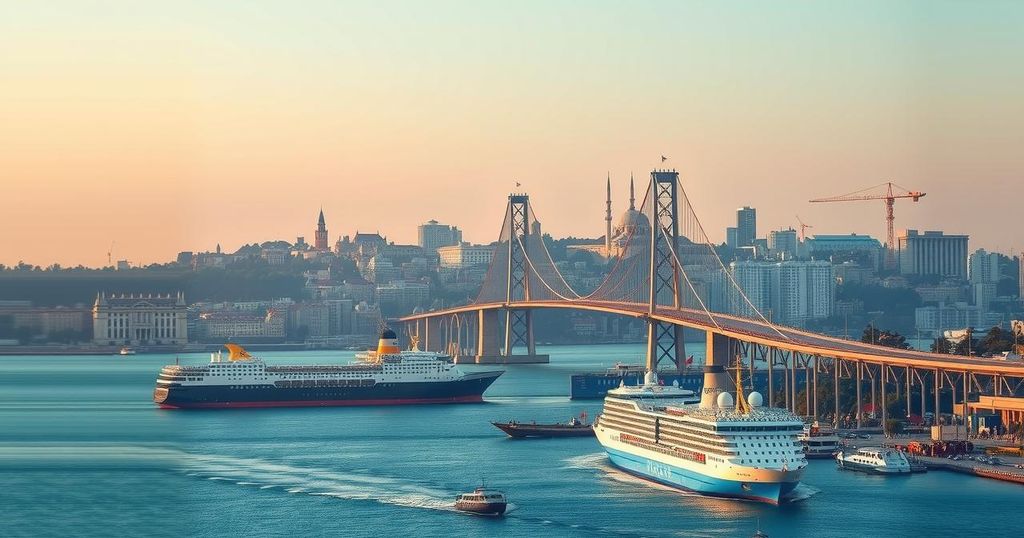World news
AP, ASIA, DONALD TUSK, ESTONIA, EUROPE, EUROPE/ASIA, EUROPEAN UNION, FRIEDRICH MERZ, INTERNATIONAL RELATIONS, ISTANBUL, KREMLIN, KYIV, MOSCOW, NORTH AMERICA, PEACE NEGOTIATIONS, PUTIN, RIYADH, RUSSIA, RUSSIA-UKRAINE WAR, SAUDI ARABIA, TALLINN, TURKEY, U. K, U. S, UKRAINE, UNITED STATES, US PRESIDENTIAL RACE, VLADIMIR PUTIN, WAR, WASHINGTON
Michael Grant
0 Comments
Prospects of Russia-Ukraine Peace Talks Gathering in Istanbul
As the conflict enters its third year, peace talks may resume in Istanbul, following calls from both Presidents Putin and Zelenskyy. With a backdrop of geopolitical pressure and public challenges to engage directly, questions regarding participants remain. The talks are a response to past failures and current military escalations, leaving the future of negotiations uncertain.
In a renewed push for peace amidst ongoing conflict, the focus has shifted to Istanbul as potential negotiations between Russia and Ukraine are contemplated. Russian President Vladimir Putin recently called for the resumption of direct peace discussions in Turkey. Meanwhile, Ukrainian President Volodymyr Zelenskyy has urged Putin to meet him there, escalating hopes for a breakthrough in the war that has persisted for nearly three years.
While the Kremlin remains tight-lipped about who, if anyone, will accompany Putin to Istanbul, Zelenskyy has made it clear he will only engage directly with the Russian leader. Ukrainian adviser Mykhailo Podolyak has reiterated that Zelenskyy will not meet with other Russian officials unless Putin himself is present. Zelenskyy conveyed that if Putin avoids the meeting, it would signal his unwillingness to conclude the war, stating, “if Putin does not arrive and plays games, it is the final point that he does not want to end the war.”
The proposal for talks in Turkey emerged after Zelenskyy held discussions with several European leaders, including French President Emmanuel Macron and U.K. Prime Minister Keir Starmer. They collectively put forth a plan for a 30-day ceasefire, a notion that received support from the European Union and U.S. President Donald Trump. However, upon learning of the ceasefire initiative, Putin countered by proposing to reignite negotiations in Istanbul without any preconditions.
As expectations rise, questions loom large about who will represent Russia and the structure of the talks. Kremlin spokesperson Dmitry Peskov deflected inquiries about the Russian delegation’s composition, stating that Putin clearly outlined Moscow’s stance. President Trump’s administration has also conducted talks in Saudi Arabia, although there is chatter about withdrawing from negotiations if progress remains stagnant. Trump has expressed cautious optimism, envisioning a positive outcome from the talks. He indicated he might personally attend in Istanbul after visiting the Middle East, but Secretary of State Marco Rubio plans to lead the U.S. delegation.
In a twist of fate from earlier discussions in Istanbul during 2022, which crumbled under differences, the current mood appears different, albeit fraught with tension. Previous negotiations were characterized by divergent demands; Zelenskyy pointed out that the Russian approach was ultimately an ultimatum rather than a genuine opening for discussion.
Both nations have established stark demands. Putin’s conditions include Ukraine recognizing Russian control over annexed territories and a significant reduction of Ukrainian military forces. In contrast, Ukraine refuses to concede any land and seeks solid security assurances to deter future threats. Trump’s administration has signaled support for these discussions, claiming Crimea would remain under Russian dominion, which some view as giving ground on Ukraine’s sovereignty.
Military confrontations continue to plague the region, with significant casualties reported. The Institute for the Study of War has highlighted Russia’s recruitment efforts to sustain its military operations, claiming they have maintained a strategic initiative along the front lines. With the war still escalating, Zelenskyy has warned that Russia may not be sincere about wanting negotiations but is instead repositioning for more significant assaults.
Additionally, efforts to establish ceasefires have repeatedly broken down, with accusations of noncompliance from both sides. While initiatives like the suspension of energy infrastructure attacks in March were attempted, they ended in failure due to alleged violations. The current momentum towards possible talks in Turkey could either lay the groundwork for a substantive dialogue or further entrench the opposing sides in their positions.
Amidst the uncertainties and speculation, Zelenskyy has indicated a willingness to meet Turkish President Recep Tayyip Erdogan in Ankara, leaving an open pathway to Istanbul should Putin decide to participate. Time will tell whether this latest attempt to broker peace will yield any significant results, but the eyes of the world are certainly set on Istanbul.
In summary, Istanbul may become the stage for pivotal peace talks between Russia and Ukraine, as both leaders display contrasting commitment levels to engage. While Putin has proposed a renewal of discussions with no preconditions, Zelenskyy insists on direct engagement only with him. The backdrop of the discussions involves demands from both sides that reflect their entrenched positions, and the potential impact of military actions raises further complexities. As preparations continue, the possibility of meaningful dialogue or continued hostilities hangs in the balance, with global attention focused on Turkey.
Original Source: www.citizentribune.com




Post Comment